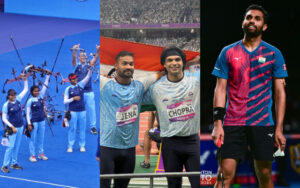
Trisha Ghosal and Rohan Chowdhury in Hangzhou
Given his status as the shining light of India’s sporting system right now, it makes sense to begin with Neeraj Chopra. Second to throw in the men’s javelin on Wednesday night, he let out a celebratory roar after the release. Like every top athlete, he just knew. The spear landed not far from the existing Asian Games record of 89.12m. Yet, after a farcical delay that lasted beyond a quarter of an hour, the judges decided in their wisdom that the distance couldn’t be registered. Neeraj was asked to do it all over again.
For Kishore Kumar Jena, his javelin teammate, it was a foul that never was. Despite the line judge gazing somewhere else and not at the arc, the red flag went up, much to the bemusement of Jena, who has been at least three inches behind the line. Neeraj intervened straight away, went up to the judges and ensured that the flag was changed to a white one.
Athletes heading into the final of a competition are like finely tuned race cars. The slightest disturbance to the routine can be disastrous. Lesser athletes might have wilted in the face of what happened inside Hangzhou’s showpiece stadium, but the Indian javelin duo responded with three incredible throws. Jena, who had never previously gone past 85m – the distance needed to secure an Olympic quota – twice smashed his personal best, finishing with a longest throw of 87.54m. On another day and against another field, that would have meant gold. But Neeraj uncorked a season’s best of 88.88m in between Jena’s throws to secure top spot on the podium at a major event yet again.
If indeed there was some sort of conspiracy to upset the concentration of India’s champion athlete — as Anju Bobby George, the Athletics Federation of India (AFI) vice-president alleged — it failed miserably. The inconvenience only seemed to spur both Neeraj and Jena to greater heights.
On Thursday morning, HS Prannoy was tussling for a place in the semifinal, and a guaranteed medal, in what has been a largely disappointing campaign for India. PV Sindhu and Kidambi Srikanth, once at the vanguard of Indian badminton, had made quarterfinal exits, while Prannoy himself had pulled out of the 2-3 defeat to China in the team final because of a sore lower back.
Having taking the first game, Prannoy had two match points in the second. But Malaysia’s Lee Zii Jia saved both and went on to take the game. And it was he that had two match points at 20-18 in the decider. By then, you could see Prannoy grimace at the end of each rally. His feet were moving purely from muscle memory and the stretches at the net must have been sheer agony.
But with disappointment staring him in the face, Prannoy dug deep to find reserves he himself probably didn’t know he had. Four straight points, and he collapsed on the court and then flung his shirt to the floor before an emotional Pullela Gopichand, the national coach, embraced him. We don’t know what shape he’ll be in for the semifinal, but Prannoy can already be proud of his heroics here.
Last, but certainly not least, the archers in the women’s compound event final found themselves 82-86 down after nine arrows against Chinese Taipei, who had upset South Korea, the favourites, in the semifinal. But the trio of Jyothi Surekha, Aditi Gopichand and Parneet Kaur responded with 13 perfect 10s and two 9s to take gold by a single point. Aditi is 17, and Parneet 18, while Jyothi is a relative veteran at 27. The strength of will and composure they showed with a gold at stake was something Neeraj would have been proud of.
For decades, Indian sport was an underperforming joke. In Hangzhou, we have seen what can happen when the latent talent is harnessed properly. This is just the beginning. The tiger is well and truly ready to roar.